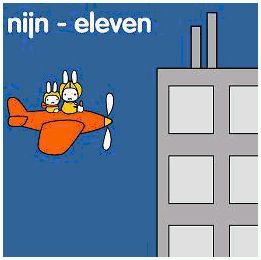A discussion of the judgment of the Amsterdam Court of Appeal of 13 September 2011, LJN BS 7825
In a case of principle the Amsterdam Court of Appeal has ruled on 13 September 2011 that parodies of Nijntje are allowed. The case concerned, inter alia, the following parody:

Earlier, the court in preliminary relief already allowed five
of the seven illustrations presented. The Court of Appeal has
stretched the boundaries even further: it considers all pictures
objected against by Dick Bruna and his company Mercis to be
permissible. The picture shown above ('nijn-eleven') was
not allowed on the basis of the 2009 judgment in preliminary relief
proceedings, but the Court of Appeal now ruled that also this
parody has an apparent humoristic and ironizing intention. It is
not necessary that everybody thinks it is funny. Therefore, this
picture is allowed on the Internet too.
The Court of Appeal has considered:"The intention of these pictures, that in combination with the accompanying texts contrast sharply with the original figure of Nijntje, is unmistakably to make people laugh, which does not alter the fact that not everybody by far will find the challenged pictures equally funny or appropriate. This case concerns parodying use, because the pictures are imitations in a somewhat modified form as a result of which the Nijntje figure is made the object of laughter and as a result of which the purport of the original work is being changed in a humoristic, mostly ironic manner. This contrast is strengthened by the combination with the accompanying texts. Where Dick Bruna's texts are pre-eminently child-friendly and non-violent, the texts with the challenged pictures are mostly rude and aggressive. (...)
For instance, successively Nijntje is shown in connection with a hardcore party, as stoned as a pebble, a trance homosexual, pep and hakkûh. This is obvious parodying use in which the work itself is aimed at and the irony is laid on thickly. This use is, regarded objectively, in agreement with what is reasonably permissible according to the rules in current social and economic life, also if it is taken into consideration that Bruna as Nijntje's spiritual father is offended by it (...)."
The Court of Appeal has furthermore argued that not every association presented as 'humor' of Nijntje with drugs, sex, terrorism, racism, or other subject matters that cannot be regarded as 'decent' will be a permissible parody. There are boundaries. The freedom of parodying use is limited by reasonableness and the rules of social and economic life. It must be adjudicated when the occasion arises whether this limitation has been observed. In this case, the Court of Appeal has deemed that these boundaries were not exceeded. And in the event of a successful reliance on the exception of parody no reliance can be made anymore on the moral rights in order to still prohibit the parody.
The above picture has taken sufficient distance from the original in order for the parody not to be regarded as an indiscriminate copy, while maintaining the recognizability of the original necessary for a parody. With regard to the obvious humoristic and ironizing intention of the parody, according to the Court of Appeal, here too it is not necessary that everybody thinks it is funny.
The Court of Appeal has ruled that there is no question of copyright infringement, because the pictures fall under the exception of parody. In addition, Mercis and Bruna had also relied on trademark law. The Court of Appeal has also denied this reliance. Because of the humoristic intention, the lack of competition motives, the distance kept to the trademarks and the lack of likelihood of confusion there is a valid reason.
The exception of parody in copyright law is a relatively new statutory provision. Until now, there was hardly any case law in this respect. This judgment of the Court of Appeal provides clear guidelines that will give practice considerable room. All in all, a fine victory for the freedom of speech.
Otto Volgenant has dealt with this case for Punt.nl, the party that was sued by Bruna/Mercis for publishing the parodies of Nijntje on the Internet.
The content of this article is intended to provide a general guide to the subject matter. Specialist advice should be sought about your specific circumstances.

